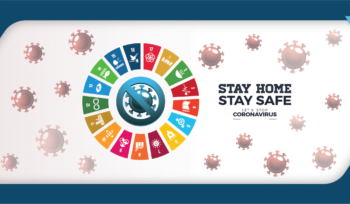Shipbreaking in Bangladesh: a controversial but promising industry
The journey of controversial ship breaking activities started before our independence, however, the commercial shipbreaking was introduced by Karnafully Metal Works Ltd in 1974. Since then Bangladesh has become one of the major shipbreaking destinations of the world.
Considerably cheap labour cost in conjunction with the possibility of maximum utilization of materials – especially steel – extracted from the recycled ships and weak regulations have driven the growth of shipbuilding industry. As a result, Bangladesh now leapfrogs India, Pakistan and Turkey in terms of dismantling recyclable vessels.
As of now, 147 shipbreaking and recycling yards which are mostly located in Sitakunda, an Upazila under Chattrogram district, have been set up by the local entrepreneurs. Only 65 yards are now thought to be operational despite receiving heavy criticism from the environmental community.
Starting a ship breaking business usually does not require much capital at the beginning as only a few equipment such as a large winch, some blowtorches and a bulldozer are needed – another reason why the number of yards has grown.
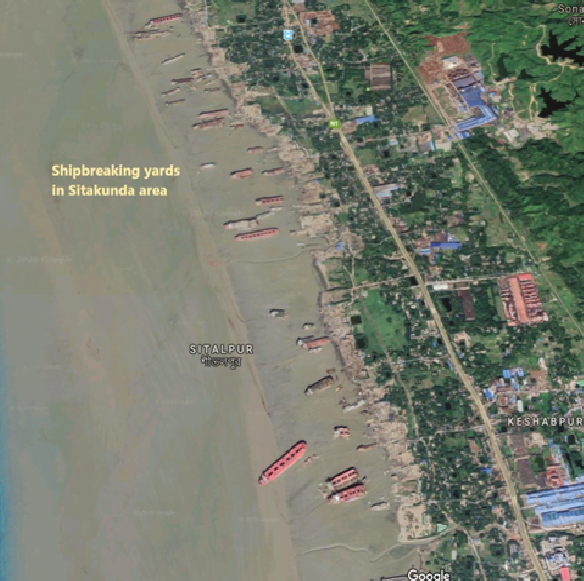
Shipbreaking yards in Sitakunda area, Chittagong
Global ship breaking activities
During 2019, Bangladesh, India, and Turkey dismantled most of the world’s vessels that needed to be recycled. These three countries alone imported more than 80% – 543 out of 674 vessels – ships for breaking last year.
Types of ships which were recycled include general cargo ship, container ship, bulk carrier, anchor handling tug supply, container ship, chemical/products tanker, fishing vessel, cement carrier, drilling ship, LPG tanker, ore carrier, refrigerated cargo ship, vehicles carrier, passenger ship, and others.
Top five countries according to import of vessel in 2019
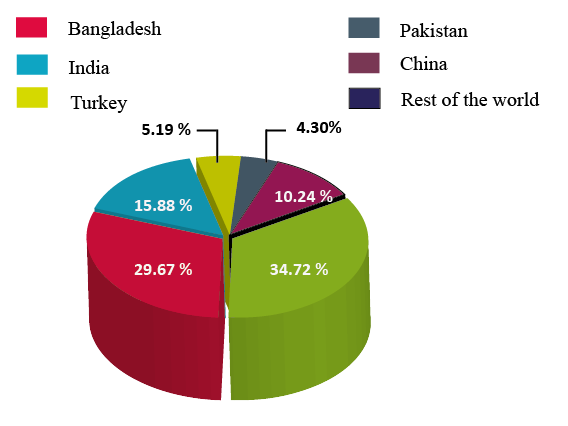
Source: NGO Ship breaking Platform
Top five countries according to LDT in 2019
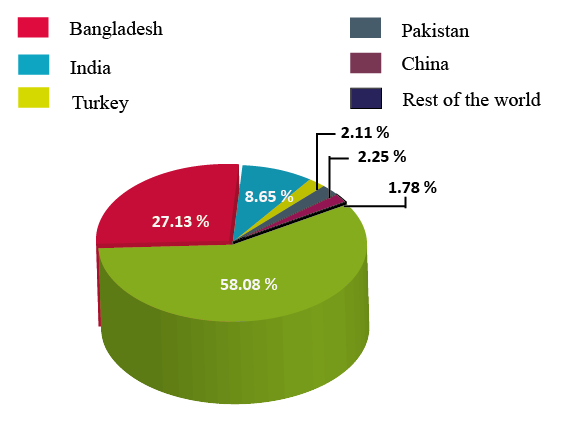
Source: NGO Ship breaking Platform
Bangladesh is also a top importer of light displacement (LDT) ships as the country imported 58.08% of the total LDT worth USD 7.85 million in 2019.
Global ship breaking activities
During 2019, Bangladesh imported 234 vessels – an increase of 10.38% more ships than that of 2018 – for dismantling. Of the total, 22.65% or 53 were container ships followed by 36 bulk carriers and 35 tankers. The number of ships imported during the last five years has always been more than 200 with a maximum of 250 vessels recorded in 2016.The following figures show the last five years import of vessels and LDT
Year wise number of imported vessel

Source: NGO Ship breaking Platform
Year wise number of imported vessel

Source: Bangladesh Ship Breakers and Recyclers Association
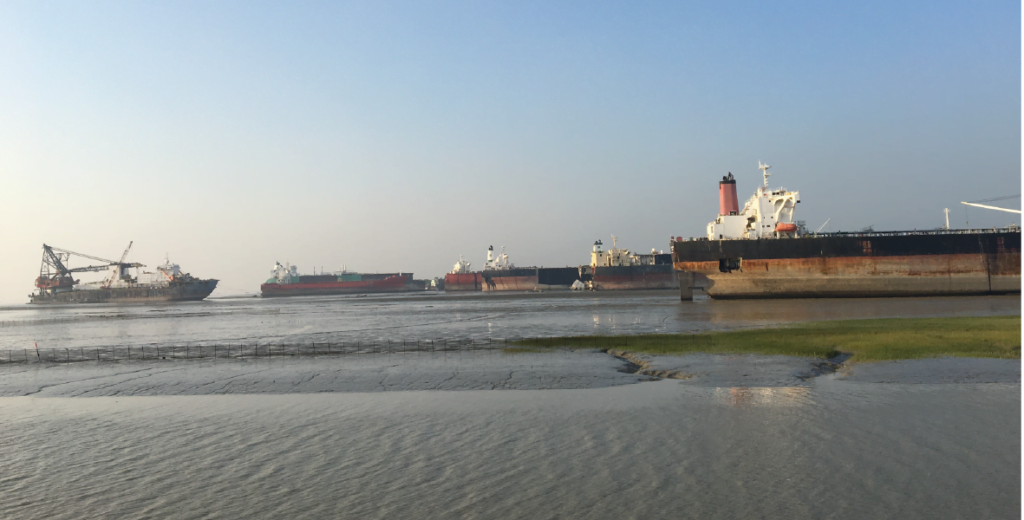
Image: NewVision Solutions Limited
Global ship breaking activities
According to Bangladesh Ship Breakers and Recyclers Association, in 2018, S N Corporation imported 16 vessels of the total 212. Other major importers include SNT Ship Recycling, Crystal Shippers Ltd, Premium Trade Corporation Ltd, Asian Marine Ship Yard, S.S. Green Ship Breaking & Recycling, K R Steel, Ferdous Steel Corporation, and S L Ship Recycling Industries, according to import data of 2018. The following figures show the major vessel and LDT importers in 2018.
Major vessel importer in 2018

Source: Bangladesh Ship Breakers and Recyclers Association
Types of materials obtained from ship dismantling
A large amount of ship scraps, one of the key raw materials to produce steel billets, is sourced from the local shipbreaking companies. Each year around 700,000 metric tons of scrap is obtained from the shipbreaking yards which are used in the local steel re-rolling mills.
This steel scrap is re-melted in the induction or electric arc furnaces to turn into ingots or billets which are then used to produce rebars, rods and light structurals such as angel, beam and channel.
A range of other variety of recyclable materials and products are also recovered from the ships including furniture, appliances, machinery, pipes, electric motors generators, hydraulic equipment, diesel engines, and others. Besides steel mills, light engineering and shipbuilding industry also largely depend on the ship breaking industry for their raw materials.
Major LDT importer in 2018

Source: Bangladesh Ship Breakers and Recyclers Association
Types of materials obtained from ship dismantling
According to the Bangladesh Institute of Labour Studies, around 32,000 to 35,000 workers are involved in ship recycling activities. Of the total employees, only 10% of them work permanently whereas the rest of them work on a temporary or part-time basis – a significant number of child labours also allegedly work in this industry.
Shipbreaking is among the most hazardous jobs in the world accounting high rate of injuries while killing 26 throughout the world last year. This death rate is particularly higher in Bangladesh as 24 people died in 2019 due to hit by iron piece, burned by fire, and asphyxiated by gas.
Ship breaking workers died in last four years in Bangladesh

Source: Bangladesh Institute of Labour Studies
What is the way forward?
Despite being labelled as a top hazardous job and criticized for its environmental impacts, this industry has been playing an important role in the national economy. Apart from steel, heavy and light engineering industries have also been benefited by using materials from ship recycling
To offset such environmental damage while keeping this industry, local shipbreaking companies should consider only bringing green vessels – certified to have no residue which is hazardous to health.
PHP Family, one of the largest conglomerates of Bangladesh, is the only company ever to purchase a certified green vessel called Ore Victoria from Brazil in 2018. PHP is also the only Bangladeshi company to achieve a green certificate for its yard from the Hong Kong International Convention for the Safe and Environmentally Sound Recycling of Ships.
With this certificate, shipbreaking companies would be able to buy vessels at a discounted price essentially reducing their operational cost. Bangladeshi shipbreaking companies should follow PHP if they are to remain in the business in the long run. Otherwise, it would be difficult to continue in the coming years as there will be more pressure from the environmental activists and strict government policies which may only allow the green yards to operate.
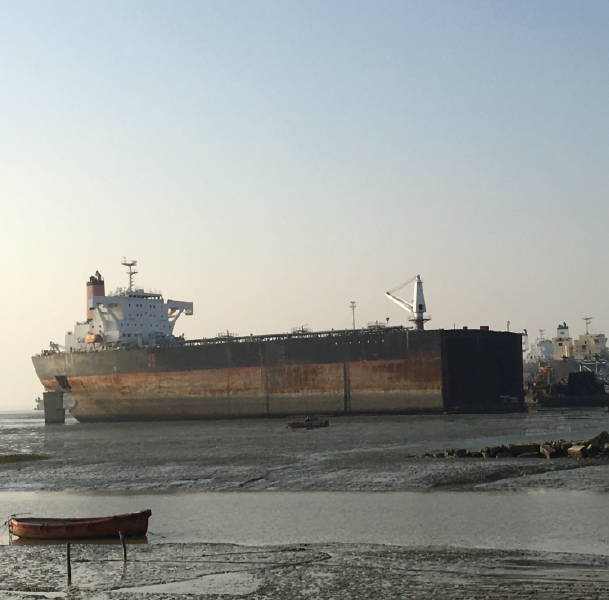
Image: NewVision Solutions Limited
Reporting by MD Nasir Uddin (nuddin@newvision.rosetech.dev), Editing and Designed by Sujon Ahamed, Business Consultant (sahamed@newvision.rosetech.dev), NewVision Solutions Ltd.





